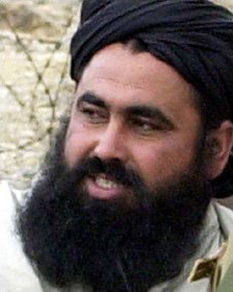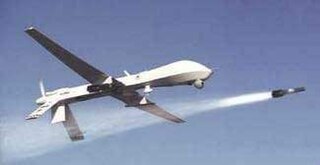Related Research Articles
Reprieve is a nonprofit organization of international lawyers and investigators whose stated goal is to "fight for the victims of extreme human rights abuses with legal action and public education". Their main focus is on the death penalty, indefinite detention without trial, extraordinary rendition and extrajudicial killing. The founding Reprieve organization is in the UK, and there are also organizations in the United States, Australia and the Netherlands, with additional supporters and volunteers worldwide.

Baitullah Mehsud was one of the founders and a leading member of the TTP in Waziristan, Pakistan, and the leader of the Tehrik-e-Taliban Pakistan (TTP). He formed the TTP from an alliance of about five militant groups in December 2007. He is thought by U.S. military analysts to have commanded up to 5,000 fighters and to have been behind numerous attacks in Pakistan including the assassination of Benazir Bhutto which he and others have denied.
Maulvi Faqir Mohammed is an Islamist militant and, until March 2012, a deputy leader of the Pakistani Taliban umbrella group Tehrik-i-Taliban Pakistan. He was reported as killed on 5 March 2010 during a helicopter gunship attack on militants by the Pakistani military although he denied the reports as false. In July 2011, he resurfaced on the air broadcasting radio shows out of Afghanistan. He was captured in Afghanistan on 17 February 2013, and released by the Afghan Taliban in 2021.
This is a list of aviation-related events from 2008.

Qari Hussain Ahmad Mehsud was a top lieutenant in the Tehrik-i-Taliban Pakistan (TTP) and the organizer of the group's suicide bombing squads. He was a cousin of Hakimullah Mehsud.

The Pakistani Taliban, formally called the Tehreek-e-Taliban-e-Pakistan, is an umbrella organization of various Islamist armed militant groups operating along the Afghan–Pakistani border. Formed in 2007 by Baitullah Mehsud, its current leader is Noor Wali Mehsud, who has publicly pledged allegiance to the Afghan Taliban. The Pakistani Taliban share a common ideology with the Afghan Taliban and have assisted them in the 2001–2021 war, but the two groups have separate operation and command structures.
The border skirmishes between the United States and Pakistan were the military engagements and confrontations between Pakistan and the United States that took place along the Afghanistan-Pakistan border from late 2008 to late 2012 resulting in the deaths of 55 Pakistani personnel with a unknown number of U.S. casualties. These incidents involved the U.S. Forces-Afghanistan Command and ISAF forces, who had been present in Afghanistan fighting Taliban and al-Qaeda insurgency, and the unified Western military command of the Pakistan Armed Forces against one another in a series of skirmishes that ceased shortly after the 2011 NATO attack in Pakistan. The two sides ultimately made peace and continued collaboration operations against insurgent groups in Pakistan following an official, however brief, apology from then-U.S. Secretary of State Hillary Clinton on 3 July 2012 over the loss of life suffered by the Pakistani military.

The Haqqani network is an Afghan Islamist group, built around the family of the same name, that has used asymmetric warfare in Afghanistan to fight against Soviet forces in the 1980s, and US-led NATO forces and the Islamic Republic of Afghanistan government in the 21st century. It is recognized as a terrorist organization by the United Nations. It is considered to be a "semi-autonomous" offshoot of the Taliban. It has been most active in eastern Afghanistan and across the border in north-west Pakistan.
On 18 June 2004, the United States under president George W. Bush began drone striking of targets in Federally-Administered Tribal Areas, Pakistan as part of the war on terror. They were conducted by the United States Air Force under the Central Intelligence Agency's Special Activities Division.

Hakimullah Mehsud, born Jamshed Mehsud and also known as Zulfiqar Mehsud, was a Pakistani militant who was the second emir of Tehrik-i-Taliban Pakistan, elected to the post on 22 August 2009. Under Mehsud's leadership the TTP attacks targeted munafaqeen in Pakistan. This meant not only religious minorities like Ahmedi and Shia Muslims, but the Sufi Barelvi sect of Sunni Islam. The TTP began "openly attacking Sufi shrines.". It was confirmed by TTP that he was killed in a U.S. drone strike in Pakistan on 1 November 2013.
23 June 2009 Makin airstrike was an attack launched by United States drones on a funeral procession in the city of Makin in South Waziristan, Pakistan. The attack targeted a funeral procession of militants killed earlier in the day in a prior similar strike by drones. Over 60 people were reported killed in what is considered perhaps the deadliest strike since the drone attacks started. Other sources claimed up to 83 people were dead. There were reports that Baitullah Mehsud was in the area but escaped unhurt while his deputy Qari Hussain was killed, although this has been disputed. Hussain later phoned reporters to prove he was still alive. The drones fired missiles when Sangeen Khan, an Afghan commander belonging to Tehrik-i-Taliban Pakistan, was holding a meeting soon after the funeral of an associate of Baitullah Mehsud.
The Datta Khel airstrike was an American airstrike carried out on 17 March 2011 in Datta Khel, North Waziristan that killed 44 people and led to widespread condemnation in Pakistan. Sherabat Khan Wazir, a top commander of Hafiz Gul Bahadur's Taliban faction, was killed in the strike, and in response Bahadur threatened to end the peace deal struck with the Pakistani government almost four years earlier. The airstrike was part of a long series of drone attacks in Pakistan carried out by the CIA and United States military. It occurred just two days after diyya, a form of compensation paid to a victim's family under Islamic law, was paid for the release of U.S. CIA operative Raymond Allen Davis, signaling a resumption of U.S. activity after a several week hiatus while Davis' pardon on murder charges was being negotiated.
Warren Weinstein was an American contractor, and director in Pakistan for J.E. Austin Associates, a firm which increases business competitiveness and growth in developing economies. He was kidnapped by eight al-Qaeda members on August 13, 2011, in Lahore, Pakistan. He was killed in a January 2015 US drone strike on the Afghanistan-Pakistan border, as announced by U.S. President Barack Obama at a White House press conference on April 23, 2015.
Ehsanullah Ehsan is a former spokesman of Tehreek-e-Taliban Pakistan (TTP) and later Jamaat-ul-Ahrar. As a spokesperson of the groups, Ehsan would use media campaigns, social media networks and call up local journalists to claim responsibility for terrorist attacks on behalf of the groups. He was initially a spokesman for the Tehreek-e-Taliban Pakistan (TTP). In 2014, he left TTP after he had developed ideological differences with the TTP leadership following the appointment of Fazlullah as the leader of the group. He later co-founded Jamaat-ul-Ahrar and became its spokesman. In 2015, as a spokesman of Jamaat-ul-Ahrar, he condemned Fazlullah-led Tehrik-e-Taliban attack on a school in Peshawar.

The Disposition Matrix, informally known as a kill list, is a database of information for tracking, capturing, rendering, or killing suspected enemies of the United States. Developed by the Obama administration beginning in 2010, it goes beyond existing kill lists and is intended to become a permanent fixture of U.S. policy. The process determining criteria for killing is not public and was heavily shaped by National Counterterrorism Director and former Central Intelligence Agency (CIA) Director John O. Brennan.
Khalid Mehsud was the deputy leader of the Tehrik-i-Taliban Pakistan and the leader of the Mehsud faction of the Taliban in South Waziristan, Pakistan. He was formerly the chief of Tehrik-i-Taliban Pakistan's South Waziristan chapter. Pakistani intelligence officials reported that he had been killed along with other 12 militants on 25 November 2015 in a drone strike carried out by the United States. Azam Tariq, spokesperson for the Sajna faction of TTP denied that he had been killed. He was killed in a drone strike on 8 February 2018 in North Waziristan, near the border with Afghanistan.

Operation Zarb-e-Azb was a joint military offensive conducted by the Pakistan Armed Forces against various militant groups, including the Tehrik-i-Taliban Pakistan (TTP), the Islamic Movement of Uzbekistan, the East Turkestan Islamic Movement, Lashkar-e-Jhangvi, al-Qaeda, Jundallah and Lashkar-e-Islam. The operation was launched on 15 June 2014 in North Waziristan along the Pakistan-Afghanistan border as a renewed effort against militancy in the wake of the 8 June attack on Jinnah International Airport in Karachi, for which the TTP and the IMU claimed responsibility. As of 14 July 2014, the operation internally displaced about 929,859 people belonging to 80,302 families from North Waziristan.

Al-Qaeda in the Indian Subcontinent usually abbreviated as AQIS, is an Islamist militant organization which aims to fight the governments of Pakistan, Afghanistan, India, Myanmar and Bangladesh in order to establish an Islamic state and seeks to establish an Islamic caliphate in Indian Subcontinent.
Mufti Noor Wali Mehsud, also known as Abu Mansoor Asim, is a Pakistani Islamic scholar, cleric and jurist who is the 4th emir of the Pakistani Taliban. On 22 June 2018, Mehsud was appointed as the emir of TTP after the assassination of former emir Mullah Fazlullah in a US drone strike in Kunar, Afghanistan.
References
- 1 2 3 "I'm on the U.S. "Kill List," Pakistani elder claims". CNN. April 22, 2016.
- ↑ "I'm on the Kill List. This is what it feels like to be hunted by drones". Independent. April 12, 2016.
- ↑ Alexandra Sims (April 12, 2016). "Malik Jalal: Man on 'Kill List' appears on BBC radio asking the UK Government not to kill him". Independent.
- ↑ "'I am on the US drone kill list'". Malik Jalal speaking to the Today programme. BBC Radio 4. April 11, 2016.